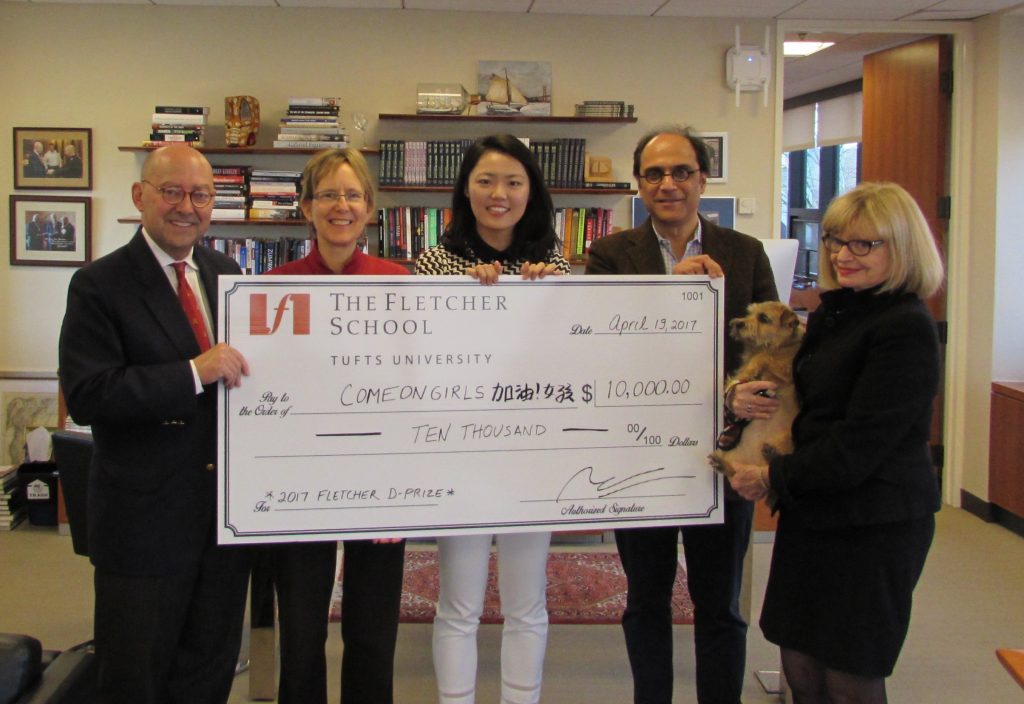ComeOnGirls: Menghan Li Wins 2017 Fletcher D-Prize
Menghan Li (F18) first realized she wanted to fight poverty while she was working with rural children. These children had been abandoned, not only because their parents needed to find employment, but also because they were female. “I started to think about how a special group of people — rural girls — suffer from dual disadvantages from the society — one from their background, the other from their gender,” Li recalls.
When she heard about The Fletcher School and The Institute for Business in the Global Context’s (IBGC) partnership with D-Prize, which awards up to $20,000 to fund new ventures that fight poverty in Africa, Asia or other developing regions, Li knew what her project would be: women’s education. Li won over the judges with her ComeOnGirls scholarship platform, and was recently announced as the 2017 Fletcher D-Prize winner.

ComeOnGirls is a nonprofit that works to alleviate poverty by improving women’s education. The pilot program will launch in Western China —where Li says two-thirds of female students drop out of school — and she hopes to expand to other countries like Brazil and India. “We want to help remove the financial barrier and gender discrimination in secondary education by awarding scholarships,” she says. “The girls we select must demonstrate outstanding academic performance or special talents, and the drive to change their own lives as well as to contribute to the long-term development of the local community.”
Once selected, girls are then digitally matched with donors by advanced algorithm on the ComeOnGirls website. “By this method, we want to give the donor a clear reason why he/she would like to sponsor this particular girl,” Li explains. “ComeOnGirls wants to be a bridge that brings donors close to talented rural girls in need of more opportunities, but at the same time, also allow donors to decide the way they want to help.”
Marilyn Davison, Advisory Board Membor at Tufts University’s Center for Entrepreneurial Leadership, has served as a friend and mentor to Li and is impressed with the team she’s assembled as well as with the ComeOnGirls platform, itself. “There are many stakeholders between Menghan’s team and the girls actually receiving the scholarships — towns, school districts, headmasters, parents — and from the very first days of the project, Menghan and her team have worked with these stakeholders — a step many nonprofits will miss or treat too casually,” Davison says.
Li’s mission, and the modern way she’s accomplishing it, impressed Fletcher’s IBGC team. “What makes Menghan’s startup so unique is she’s focused on girls’ education, and we know that any investment in girls’ education produces profound results,” says Dorothy Orszulak, IBGC’s Director of Corporate Relations. “The other thing that’s unique about it is that she’s using WeChat, a cutting-edge technology, in order to raise school funds for rural Chinese girls.”
This is the third year that Fletcher has partnered with the D-Prize. Their Program Director and Co-Founder, Nicholas Fusso, says he’s thrilled with the relationship. Fletcher students are uniquely suited for the D-Prize, and put forth impressive submissions, Fusso says. “D-Prize exists to help high-potential people take on the world’s most critical social challenges, and we feel so fortunate to have found those people among the Fletcher student population. IBGC and D-Prize together are providing a path for students to use their graduate school skills and experience to make a significant difference against global poverty.”
So far, ComeOnGirls has set up partnerships with 11 local middle schools, has gained support from the local Education Bureau in Western China and has been working to implement the scholarship program. This summer will be a busy one for Li, as she and her team plan to select their first 100 girls and then publicize their stories on the ComeOnGirls website and the WeChat platform. Li and her team also hope to attract 4,000 viewers to the website. “We want to complete 100 donations during the summer and want to build up a community between schools, girls and the donors,” she says.
In the end, Li says, education equals power: “I want to empower these girls by providing better education, which I believe is the intersection of fairness and efficiency, to achieve the goal of development. On the way to solve problems like poverty, local women’s power should not be underestimated.”